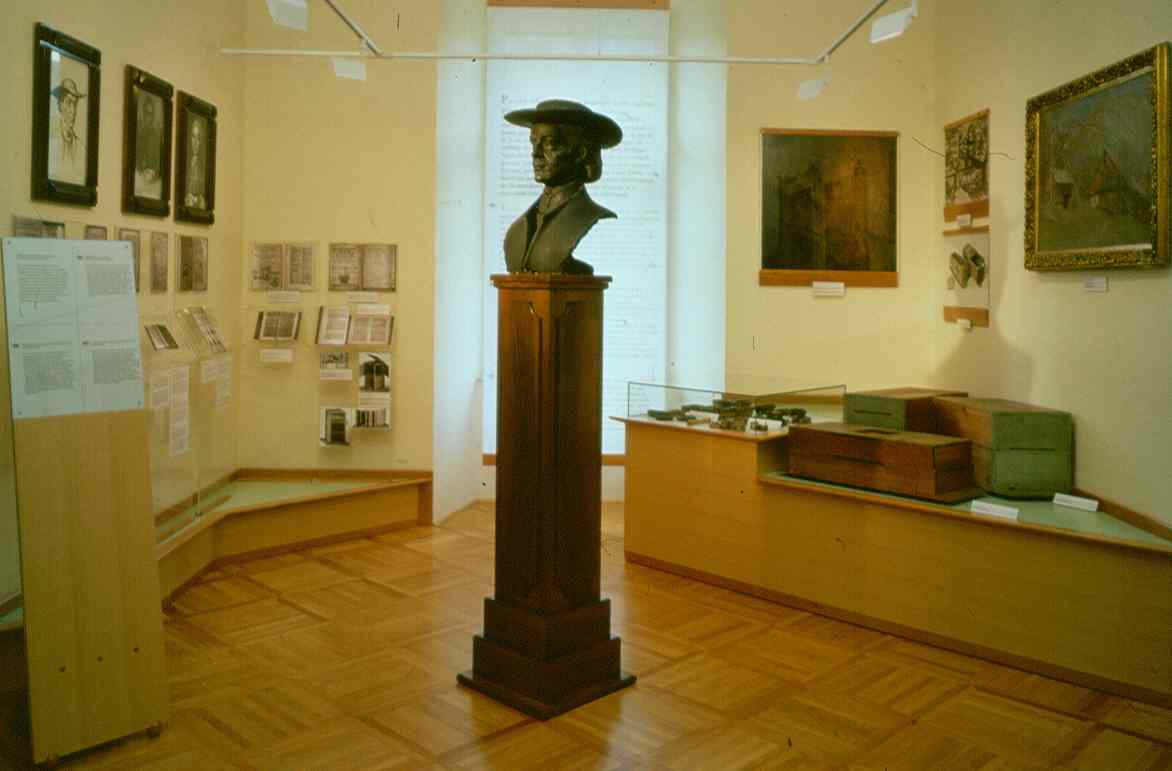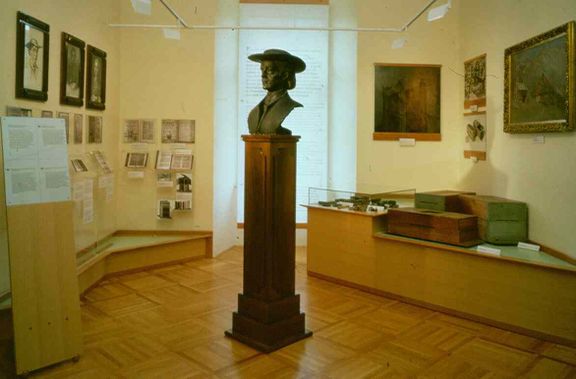Difference between revisions of "Museum of Apiculture, Radovljica"
(imported from XML by extractor/importer) |
(broken image link fix) |
||
| (35 intermediate revisions by 8 users not shown) | |||
| Line 1: | Line 1: | ||
{{Article | {{Article | ||
| − | | status = | + | | status = PHOTO |
| − | | maintainer = | + | | maintainer = Janez Premk |
}} | }} | ||
| + | |||
{{Infobox | {{Infobox | ||
| − | | name = Radovljica | + | | name = Museum of Apiculture, Radovljica |
| − | | | + | | local name = Čebelarski muzej Radovljica |
| + | | logo = Museum of Apiculture Radovljica (logo).svg | ||
| street = Linhartov trg 1 | | street = Linhartov trg 1 | ||
| town = SI-4240 Radovljica | | town = SI-4240 Radovljica | ||
| telephone = 386 (0) 4 532 0520 | | telephone = 386 (0) 4 532 0520 | ||
| fax = 386 (0) 4 532 0524 | | fax = 386 (0) 4 532 0524 | ||
| − | | email = | + | | email = cebelarski.muzej@mro.si |
| − | | website = http:// | + | | website = http://mro.si/muzeji-in-zbirke/cebelarski-muzej/ |
| − | | | + | | managed by = Radovljica Municipality Museums |
| + | | opening hours = | ||
| contacts = {{Contact | | contacts = {{Contact | ||
| − | | name = | + | | name = Tita Porenta |
| role = Curator | | role = Curator | ||
| − | | telephone = 386 (0) 4 532 | + | | telephone = 386 (0) 4 532 0527 |
}} | }} | ||
}} | }} | ||
| − | {{ | + | |
| − | The Apiculture Museum, | + | {{Teaser| |
| + | |||
| + | The [[Museum of Apiculture, Radovljica]], located in the Baroque Radovljica Mansion in the historic centre of Radovljica (together with the [[Municipal Museum of Radovljica]]), was founded in [[established::1959]] by the executive committee of the Beekeepers' Association of Slovenia in response to an appeal in the journal ''Slovenski čebelar'' (Slovene Beekeeper) to collect more material on the ancient practice of beekeeping. The museum was incorporated into the [[Radovljica Municipality Museums]] in 1963, thoroughly renovated in 1973, and again from 1996 to 2000. | ||
| + | |||
| + | {{wide Image|Museum of Apiculture Bust of Anton Janša.jpg}} | ||
| + | |||
}} | }} | ||
| + | == Background == | ||
| + | The Radovljica Mansion was rebuilt in Baroque style by the Counts of Thurn-Valsassina, who owned the manor in the period 1618–1840. The façade of the building is richly stuccoed, and the south-western portal is accentuated with strongly schematised busts of the count's family. Some sections of the adjacent French-modelled Baroque park (once known to locals as "paradise") which once belonged to the manor have been preserved. | ||
| + | |||
| + | == Programme == | ||
| + | The museum displays the rich tradition of Slovene apiculture or beekeeping which was an important branch of agriculture in the 18th and 19th centuries. The technical section of the museum shows the most typical habitats of bees and apicultural tools, the biological room highlights the life and work of the autochthonous bee "kranjska sivka" (''apis mellifera carnica''), the art exhibition features the unique Slovene folk art of painted beehive front boards. A copy of the apiary of the famous beekeeper [[Anton Janša]] (1734–1773) has been installed in nearby Breznica. | ||
| + | |||
| + | Besides the permanent exhibition on Slovene apiculture, there are also workshops and temporary exhibitions organised by the museum such as the 2009 exhibitions on ''50 Years of the Museum'' (Čebelarski muzej 1959–2009) and ''Beekeeping in Gorenjska and Dolenjska region'', co-organised with the [[Dolenjska Museum Novo mesto]]. The travelling exhibition of beehive front boards, arranged in 1978 and revised in 2001, hosts at home and abroad (for example, in 2008 in Brussels). | ||
| + | |||
| + | == See also == | ||
| + | * [[Radovljica Municipality Museums]] | ||
| + | * [[Apiculture Museum Krapje]] | ||
| + | |||
| + | == External links == | ||
| + | * [http://mro.si/english/ Museum of Apiculture, Radovljica web pages] | ||
| + | * [http://www.slovenia.si/visit/trails/beekeeping-in-slovenia/ Beekeeping in Slovenia] - in [[Sinfo Magazine]] | ||
| + | * [http://mro.si/zbirke/ Virtual collection of folk art painted beehive front boards] | ||
| + | * [https://www.theguardian.com/travel/2016/aug/07/slovenia-honey-tourism-beekeeping-bled-maribor Article about the bee-tourism in Slovenia] - from the Guardian Newspaper | ||
| + | |||
| + | {{Gallery}} | ||
[[Category:Museums]] | [[Category:Museums]] | ||
| + | [[Category:Specialised museums]] | ||
| + | [[Category:Intangible heritage]] | ||
Latest revision as of 17:33, 17 November 2020
-
11 Apr 2024
The exhibition "Buzzing Slovenia: About Bees and people" will be concluding with an international symposium "Bees for Peace - Čebele za mir". Amongst the speakers will be Kristina Seljak, the curator of Museum of Apiculture, Radovljica, and Gorazd Trušnovec, president of Slovene Urban Beekeepers' Association. The events are held in honor of the World Bee Day and the symposium is organised by Museum Europäischer Kulturen, Embassy of the Republic of Slovenia Berlin and Slovenian Cultural Centre in Berlin.
-
to
13 Jun 2023
14 Apr 2024
Exhibition Buzzing Slovenia: of Bees and People, held as part of the 19th European Culture Days, showcasing the traditions of Slovenian beekeeping and innovations in the fields of urban beekeeping and sustainable design. Co-organised by the SKICA Berlin, Embassy of the Republic of Slovenia Berlin, Slovene Ethnographic Museum and Radovljica Apiculture Museum.
-
to
13 Jun 2023
13 Jun 2023
Opening of the 2023 Slovenian Cultural Days in the framework of the 19th European Culture Days with the concert by Mirna Bogdanović, an awarded Bosnia-Slovenian jazz singer, and presentation of Slovenia by the Slovenian Tourist Board. Co-organised by the SKICA Berlin, Embassy of the Republic of Slovenia Berlin, Slovene Ethnographic Museum and Radovljica Apiculture Museum.
Background
The Radovljica Mansion was rebuilt in Baroque style by the Counts of Thurn-Valsassina, who owned the manor in the period 1618–1840. The façade of the building is richly stuccoed, and the south-western portal is accentuated with strongly schematised busts of the count's family. Some sections of the adjacent French-modelled Baroque park (once known to locals as "paradise") which once belonged to the manor have been preserved.
Programme
The museum displays the rich tradition of Slovene apiculture or beekeeping which was an important branch of agriculture in the 18th and 19th centuries. The technical section of the museum shows the most typical habitats of bees and apicultural tools, the biological room highlights the life and work of the autochthonous bee "kranjska sivka" (apis mellifera carnica), the art exhibition features the unique Slovene folk art of painted beehive front boards. A copy of the apiary of the famous beekeeper Anton Janša (1734–1773) has been installed in nearby Breznica.
Besides the permanent exhibition on Slovene apiculture, there are also workshops and temporary exhibitions organised by the museum such as the 2009 exhibitions on 50 Years of the Museum (Čebelarski muzej 1959–2009) and Beekeeping in Gorenjska and Dolenjska region, co-organised with the Dolenjska Museum Novo mesto. The travelling exhibition of beehive front boards, arranged in 1978 and revised in 2001, hosts at home and abroad (for example, in 2008 in Brussels).
See also
External links
- Museum of Apiculture, Radovljica web pages
- Beekeeping in Slovenia - in Sinfo Magazine
- Virtual collection of folk art painted beehive front boards
- Article about the bee-tourism in Slovenia - from the Guardian Newspaper





